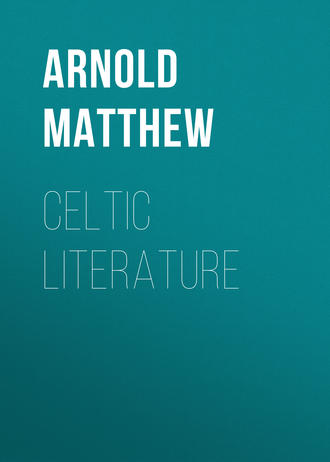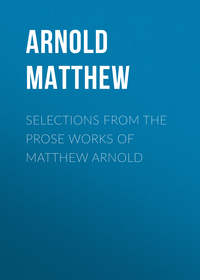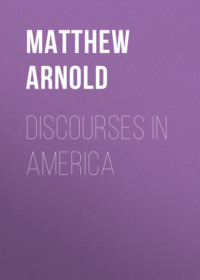 полная версия
полная версияCeltic Literature
10
‘The name of Erin,’ says Lord Strangford, ‘is treated at length in a masterly note by Whitley Stokes in the 1st series of Max Müller’s lectures (4th ed.) p. 255, where its earliest tangible form is shown to have been Iverio. Pictet’s connection with Arya is quite baseless.’
11
It is to be remembered that the above was written before the recent war between Prussia and Austria.
12
The etymology is Monsieur Henri Martin’s, but Lord Strangford says—‘Whatever gai may be, it is assuredly not Celtic. Is there any authority for this word gair, to laugh, or rather “laughter,” beyond O’Reilly? O’Reilly is no authority at all except in so far as tested and passed by the new school. It is hard to give up gavisus. But Diez, chief authority in Romanic matters, is content to accept Muratori’s reference to an old High-German gâhi, modern jähe, sharp, quick, sudden, brisk, and so to the sense of lively, animated, high in spirits.’
13
Monsieur Henri Martin, whose chapters on the Celts, in his Histoire de France, are full of information and interest.
14
The above is really a sentence taken from the Cologne Gazette. Lord Strangford’s comment here is as follows:—‘Modern Germanism, in a general estimate of Germanism, should not be taken, absolutely and necessarily, as the constant, whereof we are the variant. The Low-Dutch of Holland, anyhow, are indisputably as genuine Dutch as the High-Dutch of Germany Proper. But do they write sentences like this one—informe, ingens, cui lumen ademptum? If not, the question must be asked, not how we have come to deviate, but how the Germans have come to deviate. Our modern English prose in plain matters is often all just the same as the prose of King Alfred and the Chronicle. Ohthere’s North Sea Voyage and Wulfstan’s Baltic Voyage is the sort of thing which is sent in every day, one may say, to the Geographical or Ethnological Society, in the whole style and turn of phrase and thought.’
The mass of a stock must supply our data for judging the stock. But see, moreover, what I have said at p. 100.
15
Lord Strangford’s note on this is:—‘The Irish monks whose bells and books were found in Iceland could not have contributed anything to the old Norse spirit, for they had perished before the first Norseman had set foot on the island. The form of the old Norse poetry known to us as Icelandic, from the accident of its preservation in that island alone, is surely Pan-Teutonic from old times; the ar and method of its strictly literary cultivation must have been much influenced by the contemporary Old-English national poetry, with which the Norsemen were in constant contact; and its larger, freer, and wilder spirit must have been owing to their freer and wilder life, to say nothing of their roused and warring paganism. They could never have known any Celts save when living in embryo with other Teutons.’
Very likely Lord Strangford is right, but the proposition with which he begins is at variance with what the text quoted by Zeuss alleges.
16
Rhyme,—the most striking characteristic of our modern poetry as distinguished from that of the ancients, and a main source, to our poetry, of its magic and charm, of what we call its romantic element,—rhyme itself, all the weight of evidence tends to show, comes into our poetry from the Celts.
17
Take the following attempt to render the natural magic supposed to pervade Tieck’s poetry:—‘In diesen Dichtungen herrscht eine geheimnissvolle Innigkeit, ein sonderbares Einverständniss mit der Natur, besonders mit der Pflanzen—und Steinreich. Der Leser fühlt sich da wie in einem verzauberten Walde; er hört die unterirdischen Quellen melodisch rauschen; wildfremde Wunderblumen schauen ihn an mit ihren bunten schnsüchtigen Augen; unsichtbare Lippen küssen seine Wangen mit neckender Zärtlichkeit; hohe Pilze, wie goldne Glocken, wachsen klingend empor am Fusse der Bäume;’ and so on. Now that stroke of the hohe Pilze, the great funguses, would have been impossible to the tact and delicacy of a born lover of nature like the Celt, and could only have come from a German who has hineinstudirt himself into natural magic. It is a crying false note, which carries us at once out of the world of nature-magic and the breath of the woods, into the world of theatre-magic and the smell of gas and orange-peel.



